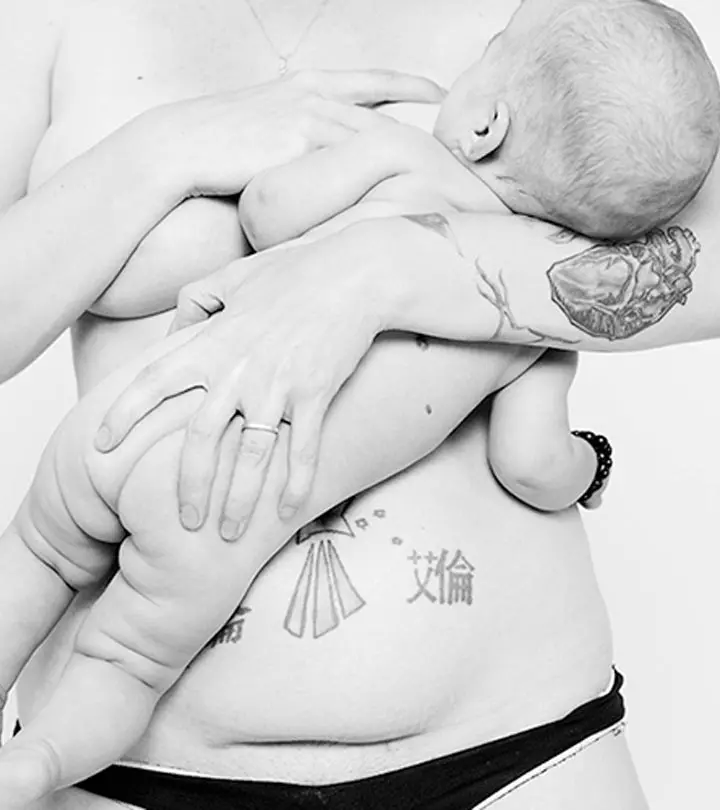

Image: Shutterstock
As your kids are growing up, they start to reveal their personality in more ways than one. Your kid does not have to be like you in every single way. If you’re an outgoing person, your kid might turn out to be more reserved, and that’s okay. Some parents say that their child is shy or sensitive, while others describe their child as easy-going or happy. There is no good or bad, and you shouldn’t tell your child to be a certain way. With time their personality will evolve, but if you understand your child’s personality from the get-go, it’ll help you use the right techniques to raise them. So here’s everything you need to know about your child’s personality:
Temperament Vs Personality
Image: Shutterstock
People often confuse personality and temperament to be the same. But there’s a lot of difference, and it’s best to understand what they are. A child’s temperament is innate, but their personality is something that develops over time. In essence, temperament refers to a behavioral style or the “how” of behavior, while personality describes “what” or “why” they do things.
At What Age Does A Child’s Personality Begin To Take Shape?
Image: Shutterstock
Typically, a child’s personality starts to develop as early as three years (1). You can tell when your child is showing specific personality traits like independence or shyness. Once they begin school, these characteristics may evolve and become more prominent until adolescence. By the time they are teenagers, their personalities will more or less be formed.
Different Types Of Personality Traits
Image: Shutterstock
Every child is different, and understanding how your child is will help you raise them better. If your kid is shy and takes time to make friends, urging them to have social interactions might not bode well. Therefore, you must understand the different kinds of personality traits in children. Here are the five most common personality traits, usually called the Big Five:
1. Conscientiousness
A trait that indicates that a person is careful and diligent in their work. They desire to do a task well and take obligations towards others seriously. A conscientious person tends to be responsible, driven, efficient and organized compared to a laid-back or disorderly person. They have good self-control and do not give in to their impulses.
2. Agreeableness
A personality trait that can be categorized as polite, kind, cooperative, and friendly, agreeable people are more trusting and display prosocial behaviors. They are more we-centric rather than being me-centric which makes them every ready to help. These kinds of people put others’ well-being before their own and choose harmony instead of discourse.
3. Neuroticism
People with a neurotic disposition tend to experience anxiety, mood disorders, and unfavorable social outcomes. These people have a general tendency towards negative emotions and have high self-doubt. They are at a higher risk of mental illness and quickly feel trapped by maladaptive thought patterns. Mindfulness and psychotherapy may help someone cope with neuroticism better.
4. Openness To Experience
A person with this personality trait is open to new experiences or ideas. They are receptive to unfamiliarity and pay more attention to their inner feelings. They seek novelty and enjoy being surprised. These people are often seen as highly curious and open-minded. They are creative and possess a hunger for learning and knowledge.
5. Extraversion
Characterized by high energy, outgoingness, and talkativeness, extravert people “recharge” their energy by being around other people as opposed to introverted people who draw energy from being alone. These people tend to seek novel experiences and social connections and might even feel bored or anxious when they spend too much time alone.
Adapting To Your Child’s Personality
Image: Shutterstock
Since every child is different, it’s up to you to understand your kids’ personality traits. Depending on their traits, you can adapt to them and raise them better. Here are a few tips for adapting to your child’s personality:
- Understand
Study your child’s personality. Observe and understand how they interact with people, what they enjoy, their reactions, tolerance, and energy levels. These are a few ways that will help determine your child’s personality.
- Appreciate
Accept your child for who they are. You might have expected to have an extroverted child, but they might be introverts. Don’t make them change to fit your preconceived notions of how they should be. Accept them and appreciate them for who they are.
- Empathize
Some personality traits can be frustrating to deal with. Maybe your child is short-tempered or throws tantrums often. It can be challenging to handle but remember that they are another human being and treat them with love and respect.
- Separate
Your child is not exactly like you. They may like flexibility while you love routine. Don’t impose your traits on them. You can still support them while being different from them. It’s important to set healthy boundaries and respect your child’s needs.
- Advocate
Several people might judge your children if they are different from theirs. Avoid these people and make sure you don’t put your kid down. Stand up for your child and use positive affirmations to combat negative comments.
It’s not easy to raise a child. It’s a huge responsibility and requires patience, dedication, and most importantly, the courage to accept them for who they are. Every parent only wants what’s best for your child, and understanding them a little better will help you help them better. We would love to hear your thoughts on this article. Share them with us in the comment below.
Community Experiences
Join the conversation and become a part of our nurturing community! Share your stories, experiences, and insights to connect with fellow parents.
















